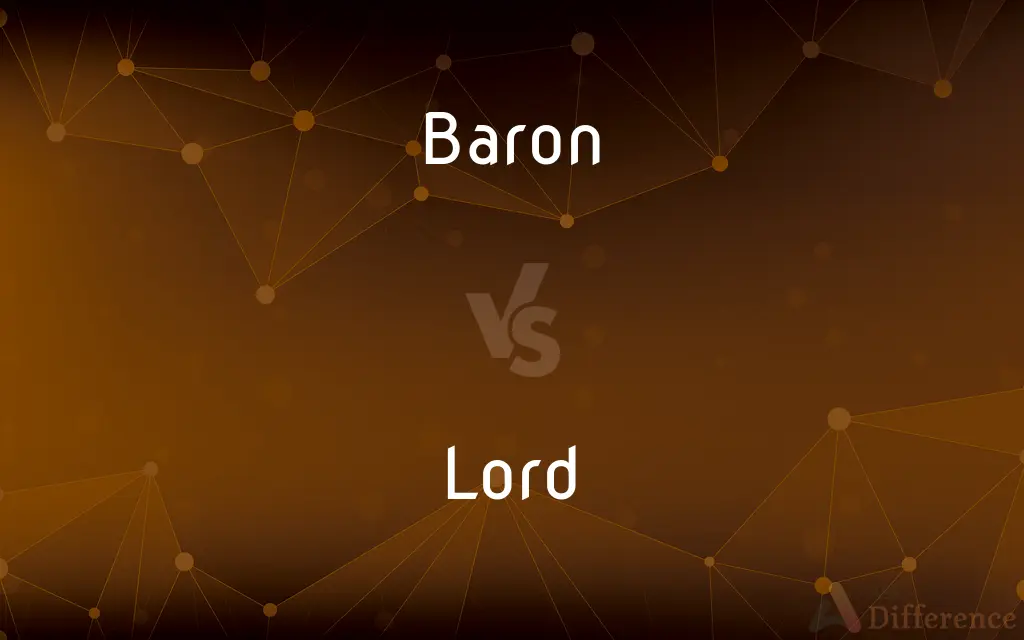Baron vs. Lord — What's the Difference?
By Tayyaba Rehman — Updated on October 27, 2023
Baron is a specific noble title, lower in hierarchy, while Lord is a general term for nobles or a title for certain peers.

Difference Between Baron and Lord
Table of Contents
ADVERTISEMENT
Key Differences
Baron is a specific rank within the nobility, typically ranking at the lower end of the aristocratic hierarchy. It is often hereditary, passed down through generations. On the other hand, Lord is a broader term that can refer to various ranks within the nobility, including barons but also higher titles like earls and dukes. The term "Lord" can be used as a general honorific for nobles.
In historical context, a baron often held land directly from the monarch and owed military service in return. This role was quite defined and specific. In contrast, the term Lord could refer to any male member of the nobility, including barons, but also extending to those with higher titles. The usage of Lord is more versatile and less tied to specific duties or land holdings.
Baron as a title is often associated with specific duties and rights, particularly in feudal times. These could include the right to collect taxes, administer justice, or hold a court. Lord, while it implies authority and respect, doesn't automatically confer specific rights or duties. It's a more general term that signifies noble status.
In contemporary usage, baron is still used as a title in countries with a system of hereditary nobility. It's a precise title, often accompanied by a surname (e.g., Baron Smith). Conversely, Lord is used in various contexts, not always related to nobility. It can be a courtesy title for certain positions (e.g., Lord Mayor), a religious title (e.g., Lord Bishop), or even in a metaphorical sense (e.g., a "lord of industry").
Comparison Chart
Rank in Nobility
A specific title, usually lower in the hierarchy.
A general term for nobles, can be higher rank.
ADVERTISEMENT
Specificity
A specific and defined title.
A broader term, can refer to various ranks.
Historical Role
Often held land from monarch, owed military service.
More versatile, not tied to specific duties.
Contemporary Usage
Still a formal title in nobility.
Used in various contexts, not just nobility.
Rights and Duties
Historically tied to specific rights and duties.
Signifies status, but not specific rights.
Compare with Definitions
Baron
A baron holds a hereditary title passed down through generations.
He became Baron of Oakridge after his father's passing.
Lord
In feudal times, a lord was someone with authority over vassals.
The peasants owed their allegiance to the lord.
Baron
A baron is a member of the lowest order of British nobility.
The baron hosted a grand ball at his estate.
Lord
Lord is an honorific for certain high-ranking individuals.
The crowd cheered as Lord Mayor entered the hall.
Baron
In medieval times, a baron was a feudal lord owing allegiance to a king.
The baron led his knights into battle.
Lord
Lord can denote someone with power or authority.
The lord of the company made an important decision.
Baron
A baron is a peer in the British House of Lords.
The baron spoke eloquently on the issue in the House of Lords.
Lord
Lord is an appellation for a person or deity who has authority, control, or power over others, acting as a master, a chief, or a ruler. The appellation can also denote certain persons who hold a title of the peerage in the United Kingdom, or are entitled to courtesy titles.
Baron
Baron is a rank of nobility or title of honour, often hereditary, in various European countries, either current or historical. The female equivalent is baroness.
Lord
A king.
Baron
A member of the lowest order of the British nobility. Baron is not used as a form of address, barons usually being referred to as ‘Lord’.
Lord
A territorial magnate.
Baron
An important or powerful person in a specified business or industry
A press baron
Lord
The proprietor of a manor.
Baron
A British nobleman of the lowest rank.
Lord
Lords The House of Lords.
Baron
A nobleman of continental Europe, ranked differently in various countries.
Lord
Used as a form of address for a marquis, an earl, or a viscount.
Baron
A Japanese nobleman of the lowest rank.
Lord
Used as the usual style for a baron.
Baron
Used as the title for such a nobleman.
Lord
Used as a courtesy title for a younger son of a duke or marquis.
Baron
A feudal tenant holding his rights and title directly from a king or another feudal superior.
Lord
Used as a title for certain high officials and dignitaries
Lord Chamberlain.
The Lord Mayor of London.
Baron
A lord or nobleman; a peer.
Lord
Used as a title for a bishop.
Baron
One having great wealth, power, and influence in a specified sphere of activity
An oil baron.
Lord
God.
Baron
A cut of beef consisting of a double sirloin.
Lord
(Christianity) Jesus.
Baron
The male ruler of a barony.
Lord
A man of renowned power or authority.
Baron
A male member of the lowest rank of English nobility (the equivalent rank in Scotland is lord).
Lord
A man who has mastery in a given field or activity.
Baron
(by extension) A person of great power in society, especially in business and politics.
Lord
(Archaic) The male head of a household.
Baron
A prisoner who gains power and influence by lending or selling goods such as tobacco.
Lord
(Archaic) A husband.
Baron
A baron of beef, a cut made up of a double sirloin.
Lord
To insist upon or boast about so as to act in a domineering or superior manner
"He had lorded over her his self-proclaimed spiritual and poetic superiority" (David Leavitt).
Baron
Any of various nymphalid butterflies of the genus Euthalia.
Lord
To act in a domineering or superior manner
An upperclassman lording over the younger students.
Baron
A husband.
Lord
To have a prominent or dominating position
The castle lords over the valley.
Baron
A title or degree of nobility; originally, the possessor of a fief, who had feudal tenants under him; in modern times, in France and Germany, a nobleman next in rank below a count; in England, a nobleman of the lowest grade in the House of Lords, being next below a viscount.
Lord
To rule over
Lorded over a vast empire.
Baron
A husband; as, baron and feme, husband and wife.
Lord
(obsolete) The master of the servants of a household; (historical) the master of a feudal manor
Baron
A nobleman (in various countries) of varying rank
Lord
(archaic) The male head of a household, a father or husband.
Baron
A British peer of the lowest rank
Lord
(archaic) The owner of a house, piece of land, or other possession
Baron
A very wealthy or powerful businessman;
An oil baron
Lord
One possessing similar mastery over others; (historical) any feudal superior generally; any nobleman or aristocrat; any chief, prince, or sovereign ruler; in Scotland, a male member of the lowest rank of nobility (the equivalent rank in England is baron)
Baron
Historically, a baron was a significant landowner with certain rights.
The baron surveyed his vast lands from the castle tower.
Lord
(historical) A feudal tenant holding his manor directly of the king
Lord
A peer of the realm, particularly a temporal one
Lord
A baron or lesser nobleman, as opposed to greater ones
Lord
One possessing similar mastery in figurative senses (esp. as lord of ~)
Lord
A magnate of a trade or profession.
Lord
(astrology) The heavenly body considered to possess a dominant influence over an event, time, etc.
Lord
A hunchback.
Lord
Sixpence.
Lord
Domineer or act like a lord.
Lord
(transitive) To invest with the dignity, power, and privileges of a lord; to grant the title of lord.
Lord
A hump-backed person; - so called sportively.
Lord
One who has power and authority; a master; a ruler; a governor; a prince; a proprietor, as of a manor.
But now I was the lordOf this fair mansion.
Man over menHe made not lord.
Lord
A titled nobleman., whether a peer of the realm or not; a bishop, as a member of the House of Lords; by courtesy; the son of a duke or marquis, or the eldest son of an earl; in a restricted sense, a baron, as opposed to noblemen of higher rank.
Lord
A title bestowed on the persons above named; and also, for honor, on certain official persons; as, lord advocate, lord chamberlain, lord chancellor, lord chief justice, etc.
Lord
A husband.
Thou worthy lordOf that unworthy wife that greeteth thee.
Lord
One of whom a fee or estate is held; the male owner of feudal land; as, the lord of the soil; the lord of the manor.
Lord
The Supreme Being; Jehovah.
Lord
The Savior; Jesus Christ.
Lord
To invest with the dignity, power, and privileges of a lord.
Lord
To rule or preside over as a lord.
Lord
To play the lord; to domineer; to rule with arbitrary or despotic sway; - sometimes with over; and sometimes with it in the manner of a transitive verb; as, rich students lording it over their classmates.
The whiles she lordeth in licentious bliss.
I see them lording it in London streets.
And lorded over them whom now they serve.
Lord
Terms referring to the Judeo-Christian God
Lord
A person who has general authority over others
Lord
A titled peer of the realm
Lord
Make a lord of someone
Lord
Lord is a title used for male members of the nobility.
The lord of the manor was well-respected in the village.
Lord
A lord often refers to a landowner or proprietor.
The lord granted the farmers permission to use his land.
Common Curiosities
Is a baron higher than a lord?
No, baron is a specific noble title, generally lower than other lords such as earls or dukes.
Is "Lord" a formal title?
It can be, especially when referring to peers in the UK, but it's also used more broadly.
Are baron titles hereditary?
Yes, baron titles are often hereditary.
Did barons have specific duties historically?
Yes, they often had military and administrative duties.
Can women hold the title of baron?
Yes, the female equivalent is "baroness."
Can "Lord" be a metaphorical title?
Yes, such as in "lord of industry" for a powerful businessman.
How does one address a baron?
As "Lord [Surname]" or "Baron [Surname]."
Can all nobles be called lords?
Yes, "lord" is a general term for male nobles, including barons.
Is there a female equivalent for "Lord"?
Yes, it's "Lady."
Is the term "Lord" used outside of nobility?
Yes, it's used in various contexts, such as "Lord Mayor" or "Lord of the Manor."
Does "Lord" imply land ownership?
Historically, yes, but in modern usage, not necessarily.
Can "Lord" refer to a religious title?
Yes, in some contexts, such as "Lord Bishop."
Are baron titles still relevant today?
Yes, they are still recognized in certain countries with hereditary nobility.
Is the title "Lord" hereditary?
It can be, especially in the case of hereditary peers, but not always.
Are there barons in countries other than the UK?
Yes, baron is a title used in various European countries.
Share Your Discovery

Previous Comparison
Obligor vs. Borrower
Next Comparison
Derivative vs. IntegralAuthor Spotlight
Written by
Tayyaba RehmanTayyaba Rehman is a distinguished writer, currently serving as a primary contributor to askdifference.com. As a researcher in semantics and etymology, Tayyaba's passion for the complexity of languages and their distinctions has found a perfect home on the platform. Tayyaba delves into the intricacies of language, distinguishing between commonly confused words and phrases, thereby providing clarity for readers worldwide.
















































